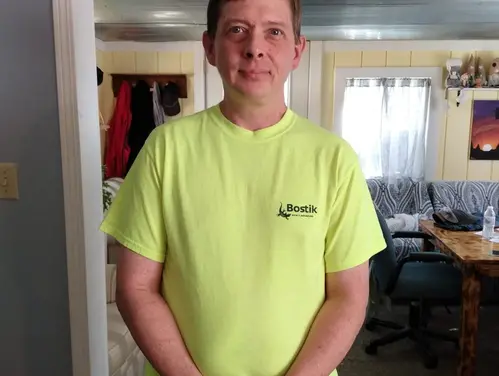When a sudden, severe health condition upended a Fort Dodge man’s life, it was a counselor from Vocational Rehabilitation Services who helped him begin to rebuild.
Counselor Tracy Arens “pointed me in the right direction and told me the options I had,” said Bret McCollum. “She gave me a lot of support.”
He needed it.
It was four years ago when McCollum, then 44, experienced a sudden onset of weakness and difficulty walking. Soon, it worsened until he wasn’t even able to crawl. When the hallucinations began, McCollum was taken to a local emergency room, where he was diagnosed with sepsis.
What followed was a week on life support in a medically induced coma with doctors at times uncertain whether he would survive. When McCollum finally awoke, he was placed on dialysis and told he would never walk again.
That didn’t sit well.
“I guess we’ll see,” McCollum said.
He spent the next few months in hospitals and a nursing home going through physical, occupational, and speech therapy to re-learn how to think, use his hands, speak, eat, and walk. He began with a walker, moved up to a cane, then learned to drive again. However, the infection left McCollum with ongoing neuropathy, dementia, and a low bone density.
That’s when he turned to Ahrens and Vocational Rehabilitation Services for help.
When McCollum started a job at McDonald's, Ahrens arranged for supported employment services to help accommodate concerns for his balance and practical and social work skills. (Vocational Rehabilitation (VR) counselors routinely meet with employers and job candidates to talk through issues, identify a plan, and work out needed accommodations for any issues that could interfere with employment.
Gradually, McCollum began extending his time at work. He built up to a full-time schedule – but then came the pain and neuropathy in his feet. Doctors eventually found that his feet were broken because of brittle bones.
Financial issues were building up, and McCollum needed to work. Voc rehab provided shoes until an infection forced an amputation of one foot. Then, he was fitted with a prosthetic. And McCollum adapted.
“I can run with my fake leg,” he said.
Through all of it, McCollum continued to work. He started a new position at Cubby’s Convenience Store to be closer to home and was able to negotiate a wage with benefits to allow him to become financially independent. He has not needed to rely on Social Security Income or any other financial supports. He currently is saving money for a new car.
McCollum, who on Facebook describes his personal philosophy as “Life is what you make it,” said he enjoys his job: “I like the customers. I like the cooking. I like everything about the job really.”
His supervisor says she likes working with McCollum and that he has found close friends at Cubby’s.
Ahrens credits his positive outlook.
“Every day is a struggle,” she said. “But Bret has the best attitude and continues to persevere.”
To learn more about assistance returning to employment after an injury or illness visit our website at www.ivrs.iowa.gov .
